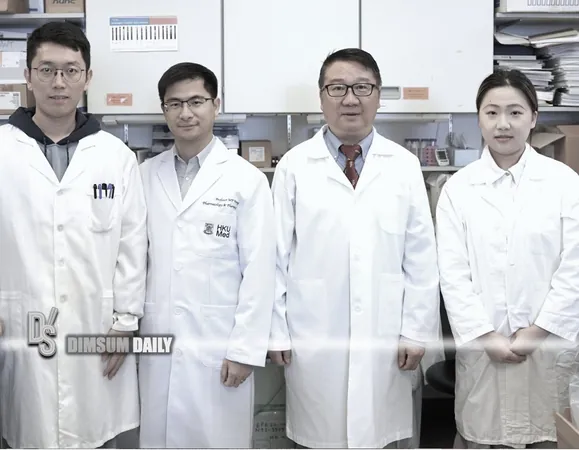
Revolutionary Cancer Treatment Unveiled: HKUMed's Photosensitive Hybrid γδ-T-Exosomes
2025-04-10
Author: Nur
Groundbreaking Discovery in Cancer Therapy
In a remarkable advancement in cancer treatment, researchers at the University of Hong Kong's LKS Faculty of Medicine (HKUMed) have unveiled a revolutionary therapy that harnesses the power of photosensitive hybrid γδ-T-exosomes (hybrid γδ-T-Exos). This innovative strategy not only targets and destroys cancer cells but also amplifies the immune system’s response, making it a game changer in the fight against cancer.
Fighting Melanoma with Precision
The hybrid γδ-T-Exos have shown outstanding promise in laboratory and animal studies, significantly reducing melanoma growth. This transformative therapy has been proven to be both potent and safe, as published in the renowned journal ACS Nano.
Harnessing the Power of γδ-T Exosomes
γδ-T exosomes are vital players in tumor control, triggering cell death (apoptosis) and enhancing anti-tumor T-cell responses. Uniquely distinct from exosomes derived from other immune cells, they not only serve as targeted tumor vaccines but also act as efficient carriers for drug delivery.
Light-Activated Power: The Role of Photodynamic Therapy
Integrating these γδ-T exosomes with photodynamic therapy (PDT)—a non-invasive method that activates a photosensitizer using light—researchers have developed a more effective treatment for melanoma. The combination promotes the creation of reactive oxygen species (ROS), crucial in combatting tumor cells.
Innovative Hybrid γδ-T-Exos Developed
The breakthrough came when researchers successfully engineered photosensitive hybrid γδ-T-Exos by merging γδ-T exosomes with Ce6-loaded liposomes. They maintained tumor-targeting capabilities and cytolytic molecules, leading to enhanced drug delivery and higher ROS generation when light was applied.
Impressive Results in Animal Studies
The hybrid therapy exhibited stellar performance, significantly suppressing melanoma in mouse models without damaging normal organs. This outcome underscores the treatment's biosafety and offers hope for safer cancer therapies moving forward.
A New Dawn for Melanoma Treatment
Professor Tu Wenwei, who led the study, emphasizes, "This is the first instance of conjugating γδ-T exosome therapy with PDT, representing a precise and immune-activating approach for melanoma treatment, pointing towards promising clinical applications."
Future Prospects of Hybrid γδ-T-Exos
The findings have vast implications for cancer therapy, especially in photo-immunotherapy. The hybrid γδ-T-Exos connect two powerful cancer-fighting mechanisms by preserving immune-stimulating abilities while enhancing anticancer effects through ROS.
Advantages of the Hybrid Approach
This novel therapy boasts numerous advantages, including accurate tumor targeting, effective apoptosis induction in melanoma cells, and broad immunity activation. It minimizes side effects by reducing off-target toxicity, promoting long-term control of tumors through enhanced immune memory.
Scalability: A Clinical Game Changer
From a clinical standpoint, hybrid γδ-T-Exos represent a scalable and practical treatment option. By using ex vivo expanded γδ-T cells sourced from healthy donors, the process simplifies therapy production compared to autologous methods, paving the way for central manufacturing and wider accessibility.
Expanding Horizons Beyond Melanoma
What’s even more thrilling is the potential of this innovative therapy to treat other aggressive cancers such as breast and colon cancer, promising an expanded impact on cancer treatment.
A Collaborative Effort
This groundbreaking study was a collaborative effort led by Professor Tu Wenwei along with Professor Wang Weiping and Dr. Li Dak-Sum at HKUMed, showcasing the power of teamwork in scientific exploration.



 Brasil (PT)
Brasil (PT)
 Canada (EN)
Canada (EN)
 Chile (ES)
Chile (ES)
 Česko (CS)
Česko (CS)
 대한민국 (KO)
대한민국 (KO)
 España (ES)
España (ES)
 France (FR)
France (FR)
 Hong Kong (EN)
Hong Kong (EN)
 Italia (IT)
Italia (IT)
 日本 (JA)
日本 (JA)
 Magyarország (HU)
Magyarország (HU)
 Norge (NO)
Norge (NO)
 Polska (PL)
Polska (PL)
 Schweiz (DE)
Schweiz (DE)
 Singapore (EN)
Singapore (EN)
 Sverige (SV)
Sverige (SV)
 Suomi (FI)
Suomi (FI)
 Türkiye (TR)
Türkiye (TR)
 الإمارات العربية المتحدة (AR)
الإمارات العربية المتحدة (AR)